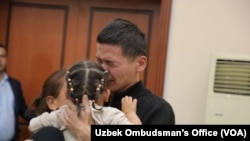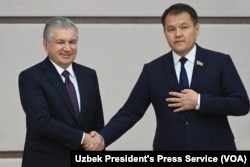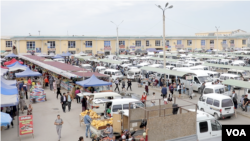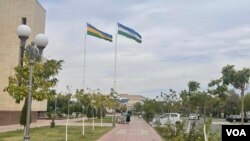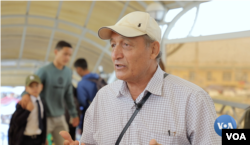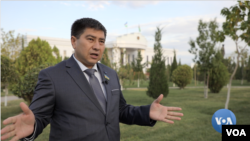Speaking under a gentle fall sun in Uzbekistan’s autonomous republic of Karakalpakstan, Deputy Speaker Rustam Saparbayev was philosophical about a wave of violent protests that tore through the region earlier this year.
“Perhaps we needed this upheaval to learn some lessons,” he said in an interview.
Saparbayev and other Karakalpak politicians know the civil unrest has turned the world’s attention to this unique part of Central Asia. Thousands of Karakalpaks marched through the capital, Nukus, on July 1 opposing a proposal to revoke Karakalpakstan’s status as a “sovereign republic” within Uzbekistan.
The rallies turned violent and on July 2, President Shavkat Mirziyoyev flew to Nukus, promising to maintain the region’s status.
“No change without your approval,” he said. But the turmoil ended with at least 21 dead, 270 injured, and more than 500 arrested. Most detainees have been released since then.
New York-based Human Rights Watch (HRW) has been urging the international community to pressure Tashkent to allow an independent inquiry, but the government has shown no indication that it is interested in doing anything more than conduct its own investigation.
Uzbek authorities told VOA that those remaining behind bars have access to lawyers, but families of the accused doubt they will receive fair trials. Ordinary Karakalpaks whom VOA talked with expressed distrust in the justice system and the leaders in Nukus and Tashkent, the Uzbek capital.
West calls for credible investigation
A mostly desert region located near the shrinking Aral Sea, Karakalpakstan is a vast and resource-rich territory occupying nearly 40% of Uzbekistan. Its 2 million diverse people, say officials, are an integral part of the country.
Uzbekistan’s Western partners support its sovereignty but have called for a credible investigation, bringing to justice those responsible for the deaths.
“Uzbekistan is doing exactly that and while we are on it, we can’t discuss the findings,” said Jenisbay Shlimbetov, Karakalpak member of the parliamentary commission probing the July events.
When questioned about the independence of this body, Shlimbetov said: “No one interferes in our work. We have not faced any barriers as we investigate. We have rights defenders among us.”
He is referring to people such as former political prisoner Azam Farmonov, who argues the international human rights community should not rush to judge the commission’s work or the state’s criminal investigation.
“Our input is significant. We have gotten 107 detainees released so far,” Farmonov pointed out.
The 14-member commission is headed by Uzbek Ombudswoman Feruza Eshmatova, whom HRW wants to engage.
HRW says Uzbek security 'unjustifiably used lethal force'
In research findings released on Monday, HRW concluded that "Uzbek security forces unjustifiably used lethal force and other excessive responses to disperse mainly peaceful demonstrators [including] types of grenades, weapons that can cause severe injuries and death...."
HRW said it has tried to talk with Uzbekistan’s Chief Prosecutor’s Office and others involved with no response thus far.
“The commission is an important step but is not independent, as it is composed mostly of politicians and officials very closely tied to the government,” Hugh Williamson, HRW’s Europe and Central Asia director, told VOA.
Alisher Qodirov, a member of the commission and deputy speaker of Uzbekistan’s Legislative Chamber, does not see the detained or those who have been released as innocent.
“They are free today because they cooperated with the investigation, and their communities have taken the responsibility to watch them,” Kadirov said, adding that “those who conspired in violence and actively took part will be punished.”
HRW is pushing for another probe.
“We really believe it is in Tashkent’s interest to take the step to ask independent experts to compile the evidence of what happened, and for this evidence then to be used as part of criminal investigations,” Williamson said. “In doing so, the government would be following its human rights commitments but also showing the international community that it is ready to see justice be done, even when it involves wrongdoing by, for instance, security forces.”
HRW suggested that Tashkent ask the office of the U.N. High Commissioner for Human Rights for independent expert nominations. OHCHR has a regional office in neighboring Kyrgyzstan with staff in Uzbekistan.
HRW examined 86 videos related to protests and 30 photographs of the dead and wounded. “Through an independent medical analysis of the visual evidence, HRW identified seven cases in which people sustained, and probably died from, severe tissue damage … by explosives,” the group reported.
'Let's work with them'
In the aftermath of the unrest, Uzbek security officials told local media that the security forces used “standard grenades” to disperse crowds, admitting they could cause serious injuries. HRW found “heavier projected grenades … 250-280 grams each, compared with 25-50 for standard grenades.”
“Uzbekistan has an obligation to respect the rights to peaceful expression and assembly, by ensuring that its security forces are trained and equipped to police demonstrations in rights-respecting ways,” it said.
Karakalpakstan’s seasoned human rights activist Azimboy Ataniyazov does not understand why Tashkent and Nukus are reluctant to allow foreign experts.
“What are we hiding?" Ataniyazov asked. "We know the number of the dead. We’ve seen plenty of video and photos from the unrest. Let international researchers come in to do their own inquiries. Let’s work with them since they want to help.”
Ataniyazov thinks the current commission’s work is a historic test for Uzbekistan’s stated commitment to democratic reform.
“If the system is really reforming, this effort should demonstrate that progress through independent findings, credible conclusions and critical recommendations,” he said.
Some Uzbek authorities, including some in the regional government, have suggested that the unrest was provoked by Karakalpak nationalists and separatists now living in other countries.
Compatriots abroad "are often misinformed about the reality at home," said Saparbayev, the Karakalpak deputy speaker.
Foreign-based Karakalpaks denounce such claims as the lies of “acutely corrupt and dishonest politicians,” arguing that citizens have every right to express their views, wherever they are. They put the blame on leaders in Tashkent and Nukus, describing their land as abused, their people repressed.
Karakalpakstan’s leaders, including Western-trained Labor Minister Yuldash Alimov, disagree.
"The conditions here are much better than before," he said. "You can’t deny our development."




